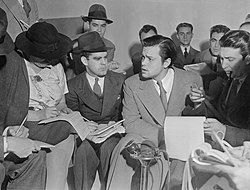
Back حرب العوالم (مسلسل إذاعي 1938) Arabic Dünyaların müharibəsi (radiotamaşa) Azerbaijani La guerra dels mons (ràdio) Catalan شەڕی جیھانەکان (درامای ڕادیۆیی) CKB Válka světů (rozhlas) Czech Ο Πόλεμος των Κόσμων (ραδιοφωνικό δράμα) Greek La guerra de los mundos (radio) Spanish The War of the Worlds (irrati drama) Basque جنگ دنیاها (اجرای رادیویی) Persian Maailmojen sota (vuoden 1938 radiokuunnelma) Finnish
| The Mercury Theatre on the Air episode | |
 Orson Welles explaining to reporters that he had not intended to cause panic (October 31, 1938) | |
| Genre | Radio drama, science fiction |
|---|---|
| Running time | 60 minutes |
| Home station | CBS Radio |
| Starring | |
| Announcer | Dan Seymour |
| Written by |
|
| Directed by | Orson Welles |
| Produced by |
|
| Executive producer(s) | Davidson Taylor (for CBS) |
| Narrated by | Orson Welles |
| Recording studio | Columbia Broadcasting Building, 485 Madison Avenue, New York |
| Original release | October 30, 1938, 8–9 pm ET |
| Opening theme | Piano Concerto No. 1 by Pyotr Ilyich Tchaikovsky |
"The War of the Worlds" was a Halloween episode of the radio series The Mercury Theatre on the Air directed and narrated by Orson Welles as an adaptation of H. G. Wells's novel The War of the Worlds (1898) that was performed and broadcast live at 8 pm ET on October 30, 1938, over the CBS Radio Network. The episode is famous for inciting a panic by convincing some members of the listening audience that a Martian invasion was taking place, though the scale of panic is disputed, as the program had relatively few listeners.[1]
The episode begins with an introductory monologue based closely on the opening of the source novel, after which the program takes on the format of an evening of typical radio programming being periodically interrupted by news bulletins. The first few bulletins interrupt a program of live music and are relatively calm reports of unusual explosions on Mars followed by a seemingly unrelated report of an unknown object falling on a farm in Grovers Mill, New Jersey. The crisis escalates dramatically when an on-scene reporter at Grovers Mill describes creatures emerging from what is evidently an alien spacecraft. The aliens employ a heat ray against police and onlookers, and the radio correspondent describes the attack in increasing panic until his audio feed abruptly goes dead. This is followed by a rapid series of news updates detailing the beginning of a devastating alien invasion and the US military's futile efforts to stop it. The first portion of the episode climaxes with a live report from a rooftop in Manhattan, from where a correspondent describes citizens fleeing from poison smoke released by towering Martian "war machines" until he coughs and falls silent. Only then does the program take its first break, about thirty minutes after Welles's introduction.
The second portion of the show shifts to a more conventional radio drama format that follows a survivor (played by Welles) dealing with the aftermath of the invasion and the ongoing Martian occupation of Earth. The final segment lasts for about sixteen minutes, and like the original novel, concludes with the revelation that the Martians have been defeated by microbes rather than by humans. The broadcast ends with a brief "out of character" announcement by Welles in which he compares the show to "dressing up in a sheet and jumping out of a bush and saying 'boo!'"
Welles's "War of the Worlds" broadcast has become famous for convincing some of its listeners that a Martian invasion was actually taking place due to the "breaking news" style of storytelling employed in the first half of the show. The illusion of realism was supported by the Mercury Theatre on the Air's lack of commercial interruptions, which meant that the first break in the drama came after all of the alarming "news" reports had taken place. Popular legend holds that some of the radio audience may have been listening to The Chase and Sanborn Hour with Edgar Bergen on NBC and tuned in to "The War of the Worlds" during a musical interlude, thereby missing the clear introduction indicating that the show was a work of science fiction. Modern research suggests that this happened only in rare instances.[2]: 67–69
In the days after the adaptation, widespread outrage was expressed in the media. The program's news-bulletin format was described as deceptive by some newspapers and public figures, leading to an outcry against the broadcasters and calls for regulation by the FCC. Welles apologized at a hastily-called news conference the next morning, and no punitive action was taken. The broadcast and subsequent publicity brought the 23-year-old Welles to the attention of the general public and gave him the reputation of an innovative storyteller and "trickster".[1][3]
- ^ a b Pooley, Jefferson; Socolow, Michael (October 28, 2013). "The Myth of the War of the Worlds Panic". Slate. Retrieved November 1, 2013.
- ^ Schwartz, A. Brad (2015). Broadcast Hysteria: Orson Welles's War of the Worlds and the Art of Fake News. New York: Hill and Wang. ISBN 978-0-8090-3161-0.
- ^ Tonguette, Peter (Fall 2018). "The Fake News of Orson Welles: The War of the Worlds at 80". Humanities: The National Endowment for the Humanities. 39 (4). Retrieved July 5, 2022.
© MMXXIII Rich X Search. We shall prevail. All rights reserved. Rich X Search